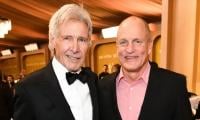True revolutionaries
Side-effect
The writer is a poet and author based in Islamabad.
Revolution is a hackneyed ter
By Harris Khalique
February 06, 2013
Side-effect
The writer is a poet and author based in Islamabad.
Revolution is a hackneyed term in today’s Pakistan. There are some wannabe prime ministers or self-declared grand political patriarchs who present themselves as messiahs and even claim to represent the whole lot of 180 million people inhabiting this country. They present us with an option – we get them absolute power and they will transform our lives for good.
My, my! Our country will soon become paradise on earth. Everyone will have enough food on their table, all our children will be in decent schools, the ill will have access to the best health facilities, electricity will be in abundance, etc. Some of them even say that Pakistan will gain its lost respect in the comity of nations if they become its leader.
Take the example of the three who have captured the imagination of our media over the years, the part of the middle class that dominates our media – Dr Tahirul Qadri, Imran Khan and Altaf Hussain. One must acknowledge that they do have the ability to mobilise a visible number of people in certain different regions in the country.
Altaf Hussain does have a concentrated popular political base in urban Sindh, demonstrated time and again. But let us begin by what is common among the three of them before getting into some detail of their significance.
One: All three speak of revolution without subscribing to any political theory or ideology. Even a neo-liberal would sound convincing when it comes to being clear about your economy and political philosophy. Qadri says that the universal values of his faith form the ideology of his revolution.
Hang on there. Why did Islamic movements in Iran, Egypt or even the Subcontinent have to produce so much theoretical writing to convince their constituents while proposing a worldly political change in the name of religion? Is Qadri’s practical ideology for revolution about transforming how the election commission is constituted and how well it functions in an otherwise unequal and unjust society? Is that it?
But lo and behold, the other revolutionary leader, Khan, says that there is no ‘left’ and ‘right’ in world politics anymore. It seems his definition of ‘left’ is limited to the experiment of Soviet Marxism.
But nay, in the same breath he has the capability to tell us that Scandinavian social democracy is his preferred model because it is closest to his understanding of Islam. He also says that when he curbs corruption within 90 days of coming to power, there will be a revolution already. Makhdooms, Tareens, Kasuris and Legharis will assist Khan in flying in a revolution – that scraps their own power and privilege – on a private jet.
Then we have Hussain, whose party has had a major share in ruling the second largest province continuously for over a decade. This is in addition to ruling or dominating the primate city of the country for decades. He also wants to bring about a revolution in Pakistan by ending feudalism, corruption, dynastic politics and bad governance. Amazing!
The first two revolutionary leaders lack theory but also lack any practical experience of political management at a large scale. In this case, there is no serious theory except political expediency and economic interest but there has been so much practice of running or participating in governments. What structural changes do we see in the economy and polity of places where Hussain’s party has ruled?
Two: All three harbingers of revolution also speak of establishing a real democratic order in the country. However, all of them supported the last military regime of Gen Pervez Musharraf when he came to power. Qadri got elected to parliament under dubious circumstances before resigning from it and leaving for Canada. Even now, when he was pontificating from a container while his disciples were cold and wet, he continued to call on the military for its support.
Khan supported Musharraf’s referendum, had his party man Abdul Sattar serve as Musharraf’s foreign minister, and even after parting ways with him served as a parliamentarian under him. I don’t believe Musharraf that easily therefore cannot hold it against Khan what Musharraf claims, ie Khan left him because he was not made the prime minister.
Likewise, there is no evidence to suggest that the former ISI chief supported Khan. But when he retired, Khan’s party did see less ‘electables’ joining them. It is known to all and sundry that Altaf Hussain’s party was hand in glove with Musharraf’s regime.
They now have the longest-serving governor of Sindh – who was originally appointed by the general. Even after cutting a hefty deal with the PPP, once in a while Hussain reminds honest and patriotic officers within the ranks of the military of bringing about a revolution.
Three: The third and the most striking commonality between the three leaders is their absolute authority over the political outfits they formed. They condemn mainstream political parties for being dominated by a few families at the top while each of their own parties is run like a one-man-show. It is quite a paradox that the supporters of the three revolutionary leaders want the PPP and the PML-N to get rid of the Sharifs and the Bhuttos while believing in the cult of personalities themselves.
Also, if I am not in the PPP or the PML-N, how can I ask for the two parties to change their leadership? It is the prerogative of the members, supporters and voters of that particular party to do so, isn’t it? If there is no such demand from within the party, why am I bothered? Besides, will those believing in the spirituality of Qadri, the greatness of Khan and the power of Hussain start voting for the PPP if Taj Haider becomes its chairperson?
Let me now remember the real revolutionaries I have known in Pakistan. There were many before them whom I have only heard or read about but the ones I have had the privilege to meet are no less. They were women and men of honour and integrity, self-effacing rather than self-loving, humble rather than cocky. They believed in an ideology, tried to understand what our deeply entrenched structural problems are, sought a political solution and waged a lifelong struggle for change in our economic order, political values, cultural practices and social behaviour.
I come from the left but hold in high esteem the committed ideological political workers of the religious parties of yesteryear as much – more than I could ever find myself respecting the wishy-washy liberals or the confused conservatives of today.
I write these lines on the day of the 14th death anniversary of Dr Aizaz Nazeer, the arch revolutionary, political worker, one of the earliest trade unionists in the country and the true champion of the rights of the oppressed – labour, peasants, women and minorities. He spent decades in prison while fighting the martial rules of Ayub, Yahya and Zia. Bhutto also kept him behind bars but he stood by Nusrat Bhutto and then Benazir in the struggle for democracy and political freedom.
The socialist revolution Nazeer believed in never came about. In some worldly sense, he and his movement did not succeed. But the way people like him transformed the consciousness, thinking, public morality, political values and personal choices for hundreds of thousands of women and men in Pakistan is comparable to none.
I last met Dr Aizaz Nazeer in 1998 before leaving the country for higher studies and was not in Pakistan when he passed away. I vividly remember him with a smile telling me in our last meeting, “Well we could have done better. But never mind. We sided with the weak, changed how people like you think.”
Email: harris.khalique@gmail.com
The writer is a poet and author based in Islamabad.
Revolution is a hackneyed term in today’s Pakistan. There are some wannabe prime ministers or self-declared grand political patriarchs who present themselves as messiahs and even claim to represent the whole lot of 180 million people inhabiting this country. They present us with an option – we get them absolute power and they will transform our lives for good.
My, my! Our country will soon become paradise on earth. Everyone will have enough food on their table, all our children will be in decent schools, the ill will have access to the best health facilities, electricity will be in abundance, etc. Some of them even say that Pakistan will gain its lost respect in the comity of nations if they become its leader.
Take the example of the three who have captured the imagination of our media over the years, the part of the middle class that dominates our media – Dr Tahirul Qadri, Imran Khan and Altaf Hussain. One must acknowledge that they do have the ability to mobilise a visible number of people in certain different regions in the country.
Altaf Hussain does have a concentrated popular political base in urban Sindh, demonstrated time and again. But let us begin by what is common among the three of them before getting into some detail of their significance.
One: All three speak of revolution without subscribing to any political theory or ideology. Even a neo-liberal would sound convincing when it comes to being clear about your economy and political philosophy. Qadri says that the universal values of his faith form the ideology of his revolution.
Hang on there. Why did Islamic movements in Iran, Egypt or even the Subcontinent have to produce so much theoretical writing to convince their constituents while proposing a worldly political change in the name of religion? Is Qadri’s practical ideology for revolution about transforming how the election commission is constituted and how well it functions in an otherwise unequal and unjust society? Is that it?
But lo and behold, the other revolutionary leader, Khan, says that there is no ‘left’ and ‘right’ in world politics anymore. It seems his definition of ‘left’ is limited to the experiment of Soviet Marxism.
But nay, in the same breath he has the capability to tell us that Scandinavian social democracy is his preferred model because it is closest to his understanding of Islam. He also says that when he curbs corruption within 90 days of coming to power, there will be a revolution already. Makhdooms, Tareens, Kasuris and Legharis will assist Khan in flying in a revolution – that scraps their own power and privilege – on a private jet.
Then we have Hussain, whose party has had a major share in ruling the second largest province continuously for over a decade. This is in addition to ruling or dominating the primate city of the country for decades. He also wants to bring about a revolution in Pakistan by ending feudalism, corruption, dynastic politics and bad governance. Amazing!
The first two revolutionary leaders lack theory but also lack any practical experience of political management at a large scale. In this case, there is no serious theory except political expediency and economic interest but there has been so much practice of running or participating in governments. What structural changes do we see in the economy and polity of places where Hussain’s party has ruled?
Two: All three harbingers of revolution also speak of establishing a real democratic order in the country. However, all of them supported the last military regime of Gen Pervez Musharraf when he came to power. Qadri got elected to parliament under dubious circumstances before resigning from it and leaving for Canada. Even now, when he was pontificating from a container while his disciples were cold and wet, he continued to call on the military for its support.
Khan supported Musharraf’s referendum, had his party man Abdul Sattar serve as Musharraf’s foreign minister, and even after parting ways with him served as a parliamentarian under him. I don’t believe Musharraf that easily therefore cannot hold it against Khan what Musharraf claims, ie Khan left him because he was not made the prime minister.
Likewise, there is no evidence to suggest that the former ISI chief supported Khan. But when he retired, Khan’s party did see less ‘electables’ joining them. It is known to all and sundry that Altaf Hussain’s party was hand in glove with Musharraf’s regime.
They now have the longest-serving governor of Sindh – who was originally appointed by the general. Even after cutting a hefty deal with the PPP, once in a while Hussain reminds honest and patriotic officers within the ranks of the military of bringing about a revolution.
Three: The third and the most striking commonality between the three leaders is their absolute authority over the political outfits they formed. They condemn mainstream political parties for being dominated by a few families at the top while each of their own parties is run like a one-man-show. It is quite a paradox that the supporters of the three revolutionary leaders want the PPP and the PML-N to get rid of the Sharifs and the Bhuttos while believing in the cult of personalities themselves.
Also, if I am not in the PPP or the PML-N, how can I ask for the two parties to change their leadership? It is the prerogative of the members, supporters and voters of that particular party to do so, isn’t it? If there is no such demand from within the party, why am I bothered? Besides, will those believing in the spirituality of Qadri, the greatness of Khan and the power of Hussain start voting for the PPP if Taj Haider becomes its chairperson?
Let me now remember the real revolutionaries I have known in Pakistan. There were many before them whom I have only heard or read about but the ones I have had the privilege to meet are no less. They were women and men of honour and integrity, self-effacing rather than self-loving, humble rather than cocky. They believed in an ideology, tried to understand what our deeply entrenched structural problems are, sought a political solution and waged a lifelong struggle for change in our economic order, political values, cultural practices and social behaviour.
I come from the left but hold in high esteem the committed ideological political workers of the religious parties of yesteryear as much – more than I could ever find myself respecting the wishy-washy liberals or the confused conservatives of today.
I write these lines on the day of the 14th death anniversary of Dr Aizaz Nazeer, the arch revolutionary, political worker, one of the earliest trade unionists in the country and the true champion of the rights of the oppressed – labour, peasants, women and minorities. He spent decades in prison while fighting the martial rules of Ayub, Yahya and Zia. Bhutto also kept him behind bars but he stood by Nusrat Bhutto and then Benazir in the struggle for democracy and political freedom.
The socialist revolution Nazeer believed in never came about. In some worldly sense, he and his movement did not succeed. But the way people like him transformed the consciousness, thinking, public morality, political values and personal choices for hundreds of thousands of women and men in Pakistan is comparable to none.
I last met Dr Aizaz Nazeer in 1998 before leaving the country for higher studies and was not in Pakistan when he passed away. I vividly remember him with a smile telling me in our last meeting, “Well we could have done better. But never mind. We sided with the weak, changed how people like you think.”
Email: harris.khalique@gmail.com
-
 Real Reason Why 'Only Murders In The Building' Cast Didn't Attend 2026 Actor Awards
Real Reason Why 'Only Murders In The Building' Cast Didn't Attend 2026 Actor Awards -
 Prince William Makes Big Decision After Princess Eugenie, Beatrice Ban
Prince William Makes Big Decision After Princess Eugenie, Beatrice Ban -
 GLP-1 Drugs Linked To Osteoporosis And Gout: New Study Reveals Higher Risks
GLP-1 Drugs Linked To Osteoporosis And Gout: New Study Reveals Higher Risks -
 Seth Rogen Unveils Catherine O’Hara's Distinguished Quality In Emotional Tribute
Seth Rogen Unveils Catherine O’Hara's Distinguished Quality In Emotional Tribute -
 MWC 2026: New Smartphones, AI Gadgets And Tech Innovations Revealed
MWC 2026: New Smartphones, AI Gadgets And Tech Innovations Revealed -
 King Offers Harry, Meghan Markle A 30 Bedroom Lodge Despite Its Decades Of Baggage: ‘it’s An Olive Branch’
King Offers Harry, Meghan Markle A 30 Bedroom Lodge Despite Its Decades Of Baggage: ‘it’s An Olive Branch’ -
 Selma Blair Talks About How Her Debilitating Disease Is 'misunderstood'
Selma Blair Talks About How Her Debilitating Disease Is 'misunderstood' -
 China’s 5-year Tech Strategy: What To Expect At Annual Parliament Meeting Amid Rivalry With West
China’s 5-year Tech Strategy: What To Expect At Annual Parliament Meeting Amid Rivalry With West -
 Andrew’s Total Meltdown On The Day Of Eviction: Insider Breaks It Down Word For Word
Andrew’s Total Meltdown On The Day Of Eviction: Insider Breaks It Down Word For Word -
 Michael J. Fox Stuns Actor Awards Audience With Rare Confession Amid Parkinson's Disease
Michael J. Fox Stuns Actor Awards Audience With Rare Confession Amid Parkinson's Disease -
 Beatrice’s In-laws Stand Against Her Marriage: ‘Furious Their Son Is Wrapped Up In Wreckage’
Beatrice’s In-laws Stand Against Her Marriage: ‘Furious Their Son Is Wrapped Up In Wreckage’ -
 Jessie Buckley Utters 'wild' Remarks For 'Hamnet' Co-star Emily Watson At Actor Awards
Jessie Buckley Utters 'wild' Remarks For 'Hamnet' Co-star Emily Watson At Actor Awards -
 Who Could Replace Ayatollah Ali Khamenei? Iran’s Top Successor Candidates Explained
Who Could Replace Ayatollah Ali Khamenei? Iran’s Top Successor Candidates Explained -
 Oliver 'Power' Grant Cause Of Death Revealed
Oliver 'Power' Grant Cause Of Death Revealed -
 Michael B. Jordan Makes Bombshell Confession At Actor Awards After BAFTA Controversy: 'Unbelievable'
Michael B. Jordan Makes Bombshell Confession At Actor Awards After BAFTA Controversy: 'Unbelievable' -
 Prince William Willing To Walk Road He ‘loathes’ For ‘horror Show’ Escape: ‘He’s Running Out Of Allies Fast’
Prince William Willing To Walk Road He ‘loathes’ For ‘horror Show’ Escape: ‘He’s Running Out Of Allies Fast’



